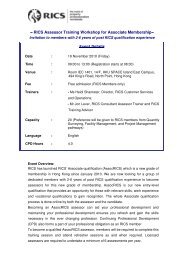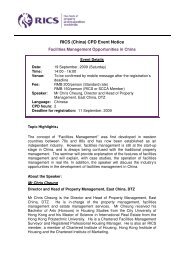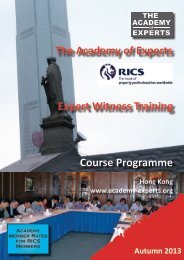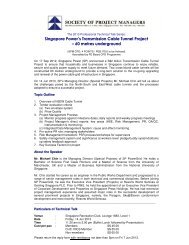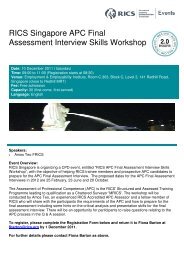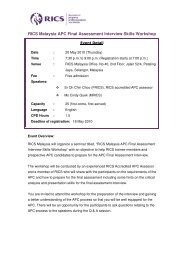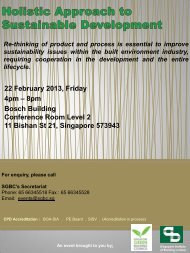View the new global professional and ethical standards - RICS ASIA
View the new global professional and ethical standards - RICS ASIA
View the new global professional and ethical standards - RICS ASIA
Create successful ePaper yourself
Turn your PDF publications into a flip-book with our unique Google optimized e-Paper software.
Global Professional Eth<br />
<strong>RICS</strong> <strong>global</strong> <strong>professional</strong><br />
<strong>and</strong> <strong>ethical</strong> st<strong>and</strong>ards<br />
Behaving <strong>ethical</strong>ly goes to <strong>the</strong> heart of what it means to be<br />
a <strong>professional</strong>. It is what distinguishes <strong>professional</strong>s from<br />
o<strong>the</strong>rs in <strong>the</strong> market place. Having a clear set of <strong>professional</strong><br />
<strong>and</strong> <strong>ethical</strong> st<strong>and</strong>ards to guide behaviour gives all those we<br />
deal with confidence in <strong>the</strong> way we do things.<br />
It is also a changing l<strong>and</strong>scape. What is acceptable<br />
behaviour now may not be in <strong>the</strong> future. So it is sensible<br />
for all professions to review, from time to time, <strong>the</strong> kinds of<br />
behaviour expected of members. This is particularly true for<br />
<strong>RICS</strong> members given <strong>the</strong> <strong>global</strong> nature of <strong>RICS</strong> membership<br />
– approximately 100,000 <strong>global</strong>ly <strong>and</strong> 80,000 students <strong>and</strong><br />
trainees.
ical St<strong>and</strong>ards<br />
Act with integrity<br />
This means being honest <strong>and</strong> straight forward in all<br />
that you do.<br />
There are five st<strong>and</strong>ards. All members must demonstrate<br />
that <strong>the</strong>y:<br />
• act with integrity<br />
• always provide a high st<strong>and</strong>ard of service<br />
• act in a way that promotes trust in <strong>the</strong> profession<br />
• treat o<strong>the</strong>rs with respect<br />
• take responsibility.
Act with integrity Alway<br />
Accompanying <strong>the</strong> st<strong>and</strong>ards is supporting information on<br />
some of <strong>the</strong> more frequent <strong>ethical</strong> issues that members <strong>and</strong><br />
regulated firms may come across. These include conflicts<br />
of interest, gifts <strong>and</strong> hospitality, <strong>and</strong> raising concerns when<br />
it appears st<strong>and</strong>ards are not being met or when <strong>the</strong>re is<br />
inappropriate behaviour. There are also a number of case<br />
studies that are linked to <strong>the</strong> st<strong>and</strong>ards, <strong>and</strong> a decision tree<br />
to help when confronted with what appears to be an<br />
<strong>ethical</strong> issue.<br />
The aim of this supporting information is to provide members<br />
<strong>and</strong> regulated firms with a conceptual framework to help with<br />
<strong>the</strong> decision making process around ethics <strong>and</strong> come to an<br />
appropriate form of action.<br />
Go to www.rics.org/ethics to see <strong>the</strong><br />
st<strong>and</strong>ards <strong>and</strong> supporting tools.
s provide a high st<strong>and</strong>ard o<br />
NO-Do not proceed<br />
NO-Do not proceed<br />
START<br />
Do you have sufficient facts<br />
on <strong>the</strong> issue?<br />
YES<br />
Is it legal?<br />
UNSURE<br />
Try to separate <strong>the</strong> facts<br />
from your or o<strong>the</strong>rs<br />
emotional response.<br />
Can you get more<br />
information or seek advice?<br />
NO-Do not proceed<br />
Decision tree<br />
YES
f service Act in a way that<br />
NO-Do not proceed<br />
NO-Do not proceed<br />
Is it in line with <strong>RICS</strong> <strong>global</strong><br />
Have you consulted with<br />
YES <strong>professional</strong> <strong>and</strong> <strong>ethical</strong> YES appropriate people to make Y<br />
st<strong>and</strong>ards?<br />
an informed decision?<br />
Have you assessed <strong>the</strong> risks<br />
involved?<br />
Have you considered what<br />
<strong>the</strong> options are?<br />
If it seems legal proceed to next stage<br />
above. If not <strong>the</strong>n do not proceed.
promotes trust in <strong>the</strong> profess<br />
NO-Do not proceed<br />
NO-Do not proceed<br />
ES<br />
Do you have clear reasoning<br />
in reaching your decision?<br />
Is your decision informed?<br />
YES<br />
Would you be content for<br />
your actions to be made<br />
public - in <strong>the</strong> <strong>new</strong>spapers<br />
or on <strong>the</strong> internet?<br />
Decide what action you are<br />
going to take.<br />
YES<br />
RECORD<br />
Record <strong>the</strong> decision <strong>and</strong> <strong>the</strong><br />
reasoning for it.<br />
ACT AND THEN<br />
REFLECT ON THE<br />
OUTCOME.
ion Treat o<strong>the</strong>rs with respe<br />
Always provide<br />
a high st<strong>and</strong>ard<br />
of service<br />
This means always<br />
ensuring that your<br />
client, or o<strong>the</strong>rs to<br />
whom you have<br />
a <strong>professional</strong><br />
responsibility, receive<br />
<strong>the</strong> best possible<br />
advice, support or<br />
performance of <strong>the</strong><br />
terms of engagement<br />
you have agreed.<br />
The importance of<br />
<strong>professional</strong> ethics<br />
Professional ethics are important<br />
because <strong>the</strong>y act as an anchor to<br />
appropriate behaviours. They ensure<br />
consistency <strong>and</strong> clarity irrespective of<br />
changing factors such as <strong>the</strong> state of<br />
<strong>the</strong> economy or business practices in<br />
different market places.<br />
<strong>RICS</strong> members want to show that<br />
<strong>the</strong>y are acting <strong>and</strong> behaving <strong>ethical</strong>ly<br />
for <strong>the</strong>ir own benefit but <strong>the</strong>y will also<br />
want to show that <strong>the</strong>y are doing so<br />
to promote <strong>the</strong> profession as a whole.<br />
The behaviour of a single member<br />
can bring <strong>the</strong> whole profession into<br />
disrepute.
ct Take responsibility<br />
About <strong>professional</strong> ethics<br />
On a day-to-day basis ethics or <strong>professional</strong> behaviour is<br />
often described as behaving appropriately, doing <strong>the</strong> right<br />
thing, acting with integrity or acting in a way that maintains<br />
or improves <strong>the</strong> trust that o<strong>the</strong>rs have in you. A very simple<br />
but effective question to ask when you are unsure about a<br />
course of action to take is ‘if you act in a certain way would<br />
you be happy for o<strong>the</strong>rs to know of your actions?’ This <strong>the</strong>n<br />
leads to questions like:<br />
• what if <strong>the</strong> information became publicly available through<br />
<strong>the</strong> press or <strong>the</strong> internet? Could you defend yourself <strong>and</strong><br />
justify your actions?<br />
• do you have a credible audit trail that can show you made<br />
an informed decision?<br />
• did you fully assess what <strong>the</strong> risks might be <strong>and</strong> who<br />
might be affected by your actions?
Act with integrity Alway<br />
Placing this into an <strong>RICS</strong> perspective, members <strong>and</strong><br />
regulated firms are expected to behave in <strong>the</strong> following way:<br />
• Bye-Law 5.2.1: requires all members to conduct<br />
<strong>the</strong>mselves in a manner befitting membership of <strong>RICS</strong>;<br />
<strong>and</strong><br />
• Rule 3 of <strong>the</strong> Rules of Conduct for Members <strong>and</strong> <strong>the</strong><br />
Rules of Conduct for Firms require members <strong>and</strong><br />
regulated firms, respectively, to act with integrity at all<br />
times <strong>and</strong> avoid conflicts of interest <strong>and</strong> any actions or<br />
situations that are inconsistent with <strong>the</strong>ir <strong>professional</strong><br />
obligations.<br />
Any serious deviation from <strong>the</strong> st<strong>and</strong>ards may lead to<br />
disciplinary action being taken by <strong>RICS</strong>.
s provide a high st<strong>and</strong>ard o<br />
Act in a way<br />
that promotes<br />
trust in <strong>the</strong><br />
profession<br />
This means acting in a<br />
manner, both in your<br />
<strong>professional</strong> life <strong>and</strong><br />
private life, to promote<br />
you, your firm or<br />
organisation you work<br />
for <strong>and</strong> <strong>the</strong> profession<br />
in a <strong>professional</strong> <strong>and</strong><br />
positive way.<br />
Trust<br />
There is a special relationship between<br />
<strong>professional</strong>s <strong>and</strong> <strong>the</strong>ir clients. It’s<br />
a relationship based on trust. The<br />
<strong>ethical</strong> st<strong>and</strong>ards provide confidence<br />
to <strong>the</strong> public <strong>and</strong> o<strong>the</strong>rs about <strong>the</strong><br />
reliability <strong>and</strong> high st<strong>and</strong>ards <strong>the</strong>y can<br />
expect when using <strong>the</strong> services of a<br />
<strong>professional</strong>. Trust is essential <strong>and</strong> is<br />
hard to gain <strong>and</strong> maintain but can be<br />
lost very easily.
f service Act in a way that<br />
How can you decide if you should be worried<br />
about something?<br />
Here are some issues that could raise your concern. The list<br />
is not exhaustive or exclusive:<br />
• conduct which may be an offence or unlawful<br />
• poor <strong>professional</strong> service or incompetence by ano<strong>the</strong>r<br />
<strong>RICS</strong> member<br />
• a failure to comply with legislation or applicable regulations<br />
(e.g. health <strong>and</strong> safety guidance, anti-discrimination<br />
legislation, anti-bribery legislation)<br />
• failure to comply with your firm’s policy<br />
• reckless conduct in <strong>the</strong> workplace<br />
• deliberate or unintentional discrimination<br />
• disclosures suggesting a miscarriage of justice<br />
• health <strong>and</strong> safety risks, including risks to <strong>the</strong> public as well<br />
as o<strong>the</strong>r staff or colleagues.
promotes trust in <strong>the</strong> profess<br />
What should you do?<br />
If you are in a position where you have concerns <strong>the</strong>n you will<br />
want to:<br />
• ga<strong>the</strong>r <strong>the</strong> facts that you have; do you have enough facts<br />
to come to a decision?<br />
• speak to someone about your concerns. In <strong>the</strong> first<br />
instance you may want to raise your concerns with<br />
someone whom you feel comfortable with<br />
Treat o<strong>the</strong>rs with respect<br />
This means treating people with courtesy, politeness, <strong>and</strong><br />
consideration, no matter <strong>the</strong>ir race, religion, size, age,<br />
country of origin, gender, sexual orientation or disability.<br />
It also means being aware of cultural sensitivities <strong>and</strong><br />
business practices.
ion Treat o<strong>the</strong>rs with respe<br />
Take responsibility<br />
This means being accountable for all your actions – don’t<br />
blame o<strong>the</strong>rs if things go wrong, <strong>and</strong> if you suspect something<br />
isn’t right be prepared to do something.<br />
• if you still have concerns <strong>the</strong>n you will want to raise <strong>the</strong>se<br />
more formally with, <strong>and</strong> take advice from, an appropriate<br />
person. This could be one of <strong>the</strong> people involved in<br />
<strong>the</strong> situation, your manager, a colleague, ano<strong>the</strong>r <strong>RICS</strong><br />
member, ano<strong>the</strong>r <strong>professional</strong>, a community leader, <strong>RICS</strong>,<br />
or any o<strong>the</strong>r appropriate organisation, including <strong>the</strong> police<br />
• once you have taken advice you will want to make a<br />
decision <strong>and</strong> ensure that something is done. This may<br />
mean that you actually take <strong>the</strong> issue forward or it may<br />
mean that someone more appropriate takes it forward.
ct Take responsibility<br />
Use <strong>the</strong> decision tree as a guide to help make an informed<br />
decision.<br />
• Regulation confidential helpline call:<br />
+44 (0)20 7334 3867<br />
• Regulation helpline (non-confidential queries) call:<br />
+44 (0)20 7695 1670<br />
• Or e-mail:<br />
regulation@rics.org<br />
Visit www.rics.org/ethics to read information<br />
<strong>and</strong> guidance on <strong>the</strong> st<strong>and</strong>ards, supporting<br />
tools <strong>and</strong> case studies.
ics.org<br />
<strong>RICS</strong> HQ<br />
Parliament Square<br />
London SW1P 3AD<br />
United Kingdom<br />
Worldwide media<br />
enquiries:<br />
e pressoffice@rics.org<br />
Contact Centre:<br />
e contactrics@rics.org<br />
t +44 (0)870 333 1600<br />
f +44 (0)20 7334 3811<br />
Advancing st<strong>and</strong>ards in l<strong>and</strong>, property <strong>and</strong> construction.<br />
<strong>RICS</strong> is <strong>the</strong> world’s leading qualification when it comes to<br />
<strong>professional</strong> st<strong>and</strong>ards in l<strong>and</strong>, property <strong>and</strong> construction.<br />
In a world where more <strong>and</strong> more people, governments, banks<br />
<strong>and</strong> commercial organisations dem<strong>and</strong> greater certainty of<br />
<strong>professional</strong> st<strong>and</strong>ards <strong>and</strong> ethics, attaining <strong>RICS</strong> status is <strong>the</strong><br />
recognised mark of property <strong>professional</strong>ism.<br />
Over 100 000 property <strong>professional</strong>s working in <strong>the</strong> major<br />
established <strong>and</strong> emerging economies of <strong>the</strong> world have already<br />
recognised <strong>the</strong> importance of securing <strong>RICS</strong> status by becoming<br />
members.<br />
<strong>RICS</strong> is an independent <strong>professional</strong> body originally established<br />
in <strong>the</strong> UK by Royal Charter. Since 1868, <strong>RICS</strong> has been<br />
committed to setting <strong>and</strong> upholding <strong>the</strong> highest st<strong>and</strong>ards of<br />
excellence <strong>and</strong> integrity – providing impartial, authoritative<br />
advice on key issues affecting businesses <strong>and</strong> society.<br />
<strong>RICS</strong> is a regulator of both its individual members <strong>and</strong> firms<br />
enabling it to maintain <strong>the</strong> highest st<strong>and</strong>ards <strong>and</strong> providing <strong>the</strong><br />
basis for unparalleled client confidence in <strong>the</strong> sector.<br />
<strong>RICS</strong> has a worldwide network. For fur<strong>the</strong>r information simply<br />
contact <strong>the</strong> relevant <strong>RICS</strong> office or our Contact Centre.



